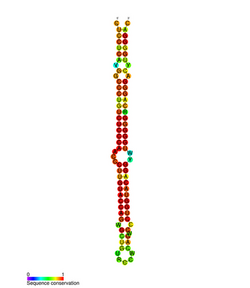Biology:miR-150
| miR-150 | |
|---|---|
 Conserved secondary structure of miR-150 microRNA precursor | |
| Identifiers | |
| Symbol | miR-150 |
| Alt. Symbols | MIR150 |
| Rfam | RF00767 |
| miRBase | MI0000479 |
| miRBase family | MIPF0000197 |
| NCBI Gene | 406942 |
| HGNC | 31537 |
| OMIM | 610566 |
| RefSeq | NR_029703 |
| Other data | |
| RNA type | miRNA |
| Domain(s) | Mammalia |
| GO | 0035195 |
| SO | 0001244 |
| Locus | Chr. 19 q13.33 |
| PDB structures | PDBe |
miR-150 is a family of microRNA precursors found in mammals, including humans. The ~22 nucleotide mature miRNA sequence is excised from the precursor hairpin by the enzyme Dicer.[1] This sequence then associates with RISC which effects RNA interference.[2]
miR-150 functions in hematopoiesis; it regulates genes whose downstream products encourage differentiating stem cells towards becoming megakaryocytes rather than erythrocytes.[3][4] It is also thought to control B and T cell differentiation, alongside miR-155.[5][6]
Role in cancer
miR-150 has been linked with a number of cancers. It is thought to promote cancer cell proliferation in gastric cancer and has also been found to be more than 50x overexpressed in osteosarcoma.[7]
Applications
miR-150 levels in blood plasma can be indicative of early sepsis; it could have a future use therapeutically in treating the condition.[8] In addition, miR-150 is one of a number of microRNAs whose expression profile could be used as a biomarker of hepatocellular carcinoma.[9]
References
- ↑ "microRNAs: tiny regulators with great potential". Cell 107 (7): 823–6. Dec 2001. doi:10.1016/S0092-8674(01)00616-X. PMID 11779458.
- ↑ "Human RISC couples microRNA biogenesis and posttranscriptional gene silencing". Cell 123 (4): 631–40. Nov 2005. doi:10.1016/j.cell.2005.10.022. PMID 16271387.
- ↑ "MicroRNA-mediated control of cell fate in megakaryocyte-erythrocyte progenitors". Developmental Cell 14 (6): 843–53. Jun 2008. doi:10.1016/j.devcel.2008.03.012. PMID 18539114.
- ↑ "MicroRNAs in platelet production and activation". Blood 117 (20): 5289–96. May 2011. doi:10.1182/blood-2011-01-292011. PMID 21364189.
- ↑ "The role of microRNAs in normal and malignant hematopoiesis". European Journal of Haematology 84 (1): 1–16. Jan 2010. doi:10.1111/j.1600-0609.2009.01348.x. PMID 19744129.
- ↑ "MicroRNAs in normal and malignant hematopoiesis". Current Opinion in Hematology 15 (4): 352–8. Jul 2008. doi:10.1097/MOH.0b013e328303e15d. PMID 18536574.
- ↑ "Identification of Differentially Expressed MicroRNAs in Osteosarcoma". Sarcoma 2011: 732690. 2011. doi:10.1155/2011/732690. PMID 21789031.
- ↑ Gold, Jeffrey A, ed (2009-10-12). "MicroRNA fingerprints identify miR-150 as a plasma prognostic marker in patients with sepsis". PLOS ONE 4 (10): e7405. doi:10.1371/journal.pone.0007405. PMID 19823581. Bibcode: 2009PLoSO...4.7405V.
- ↑ "Altered microRNA Expression Patterns in Hepatoblastoma Patients". Translational Oncology 2 (3): 157–63. Aug 2009. doi:10.1593/tlo.09124. PMID 19701500.
Further reading
- "microRNAs and the immune response". Current Opinion in Pharmacology 9 (4): 514–20. Aug 2009. doi:10.1016/j.coph.2009.05.003. PMID 19525145.
- "Blockade of miR-150 maturation by MLL-fusion/MYC/LIN-28 is required for MLL-associated leukemia". Cancer Cell 22 (4): 524–35. Oct 2012. doi:10.1016/j.ccr.2012.08.028. PMID 23079661.
 |

